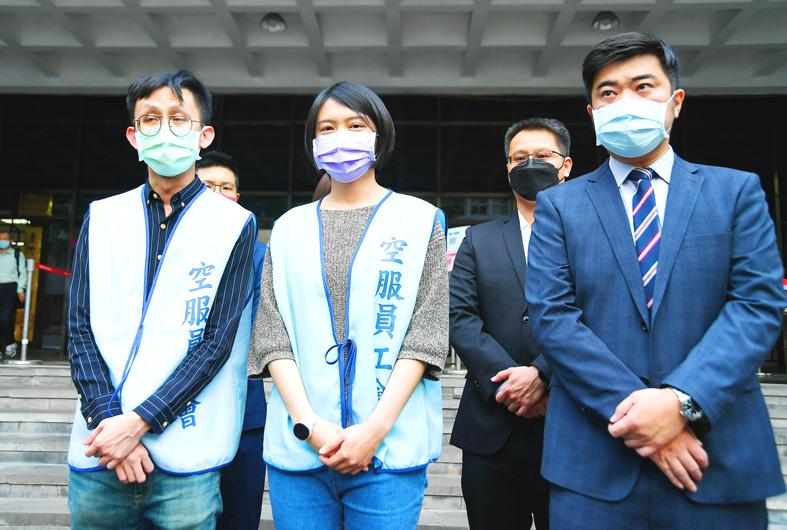The Taipei District Court yesterday ruled against EVA Airways Corp (長榮航空), which had claimed that a 2019 strike by unionized employees was illegal, seeking compensation from the Taoyuan Flight Attendants’ Union for daily financial losses of NT$34 million (US$1.19 million at the current exchange rate).
Union officials said the ruling was a victory and that the airline should refrain from appealing the decision.
Union members on April 19, 2019, voted to go on strike, after their representatives and the airline could not agree on improved salaries and working conditions.

Photo: CNA
Union members were on strike from June 20 to July 6 that year, when the two sides signed an agreement.
However, EVA Airways’ lawyers filed a lawsuit on the second day of the strike, claiming that it was illegal.
The striking workers breached their employment contracts and the union’s demand that the company’s board must feature at least one labor representative was impossible to fulfill, the lawyers said.
Shareholders elect members to the board, and there is no way for management to intervene, they said.
The court filing cited EVA Airways as saying: “The union’s decision to go on strike seriously affected the company’s reputation and revenues, and led to losses of assets.”
The airline sought compensation for daily financial losses of NT$34 million, based on estimated losses due to a one-day grounding of all EVA Airways flights during Typhoon Nesat on July 30, 2017, the filing showed.
The court ruled that the strike was legal based on the Act for Settlement of Labor-Management Disputes (勞資爭議處理法).
The strike largely disrupted operations and led to financial losses, but the claimant did not provide evidence that the union negotiated in bad faith, the court said.
Eva Airways late yesterday said it would appeal the ruling.
Additional reporting by CNA

Taiwanese actress Barbie Hsu (徐熙媛) has died of pneumonia at the age of 48 while on a trip to Japan, where she contracted influenza during the Lunar New Year holiday, her sister confirmed today through an agent. "Our whole family came to Japan for a trip, and my dearest and most kindhearted sister Barbie Hsu died of influenza-induced pneumonia and unfortunately left us," Hsu's sister and talk show hostess Dee Hsu (徐熙娣) said. "I was grateful to be her sister in this life and that we got to care for and spend time with each other. I will always be grateful to

REMINDER: Of the 6.78 million doses of flu vaccine Taiwan purchased for this flu season, about 200,000 are still available, an official said, following Big S’ death As news broke of the death of Taiwanese actress and singer Barbie Hsu (徐熙媛), also known as Big S (大S), from severe flu complications, the Centers for Disease Control (CDC) and doctors yesterday urged people at high risk to get vaccinated and be alert to signs of severe illness. Hsu’s family yesterday confirmed that the actress died on a family holiday in Japan due to pneumonia during the Lunar New Year holiday. CDC Deputy Director-General Tseng Shu-hui (曾淑慧) told an impromptu news conference that hospital visits for flu-like illnesses from Jan. 19 to Jan. 25 reached 162,352 — the highest

TAIWAN DEFENSE: The initiative would involve integrating various systems in a fast-paced manner through the use of common software to obstruct a Chinese invasion The first tranche of the US Navy’s “Replicator” initiative aimed at obstructing a Chinese invasion of Taiwan would be ready by August, a US Naval Institute (USNI) News report on Tuesday said. The initiative is part of a larger defense strategy for Taiwan, and would involve launching thousands of uncrewed submarines, surface vessels and aerial vehicles around Taiwan to buy the nation and its partners time to assemble a response. The plan was first made public by the Washington Post in June last year, when it cited comments by US Indo-Pacific Commander Admiral Samuel Paparo on the sidelines of the Shangri-La Dialogue

Suspected Chinese spies posing as Taiwanese tourists have been arrested for allegedly taking photographs of Philippine Coast Guard ships, local media reported. The suspected spies stayed at a resort in Palawan, where from a secluded location they used their phones to record coast guard ships entering and leaving a base, Philippine TV network GMA said on Wednesday. Palawan is near the Spratly Islands (Nansha Islands, 南沙群島) and other disputed areas of the South China Sea, where tensions have been on the rise between China and the Philippines. The suspects allegedly also used drones without permission and installed cameras on coconut trees in the